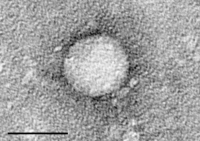
Photo from wikipedia
The predictive effect of quantitative anti-hepatitis B core on double-negative HBV DNA and RNA remains unstudied. We observed dynamic changes in this measure in chronic hepatitis B patients receiving entecavir… Click to show full abstract
The predictive effect of quantitative anti-hepatitis B core on double-negative HBV DNA and RNA remains unstudied. We observed dynamic changes in this measure in chronic hepatitis B patients receiving entecavir for 10 years, evaluating its predictive value for double-negative HBV DNA and RNA. Twenty-seven chronic hepatitis B patients treated with entecavir for 10 years were enrolled in this study. Liver function, quantitative anti-hepatitis B core, hepatitis B surface and e antigens, HBV DNA and RNA were measured at baseline and each follow-up. Virological response was defined as double-negative HBV DNA and RNA; serological response was defined as hepatitis B e antigen seroconversion. After antiviral therapy, quantitative anti-hepatitis B core showed an overall downward trend. Patients with virological response had significantly higher quantitative anti-hepatitis B core levels than those without virological response at baseline. Patients with serological response also had higher quantitative anti-hepatitis B core levels than those without serological response at baseline and week 24. Baseline quantitative anti-hepatitis B core level was the only independent predictor for virological and serological responses. Baseline quantitative anti-hepatitis B core level was powerfully predictive of double-negative HBV DNA and RNA in chronic hepatitis B patients receiving long-term entecavir therapy.
Journal Title: Scientific Reports
Year Published: 2021
Link to full text (if available)
Share on Social Media: Sign Up to like & get
recommendations!